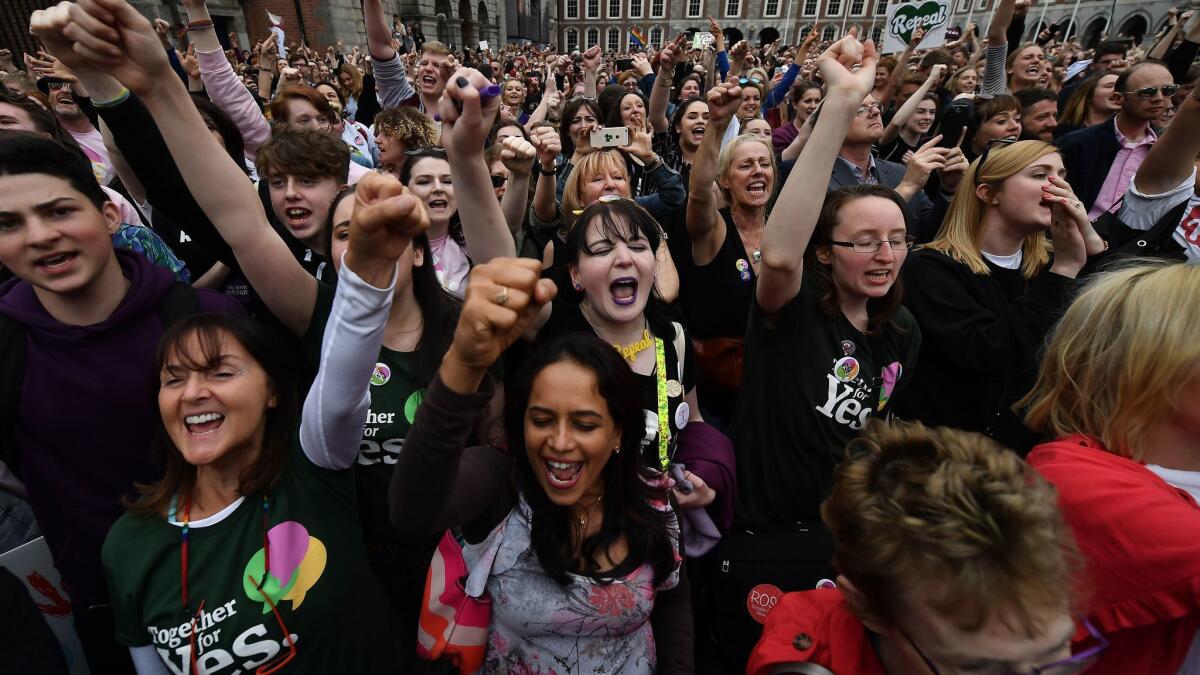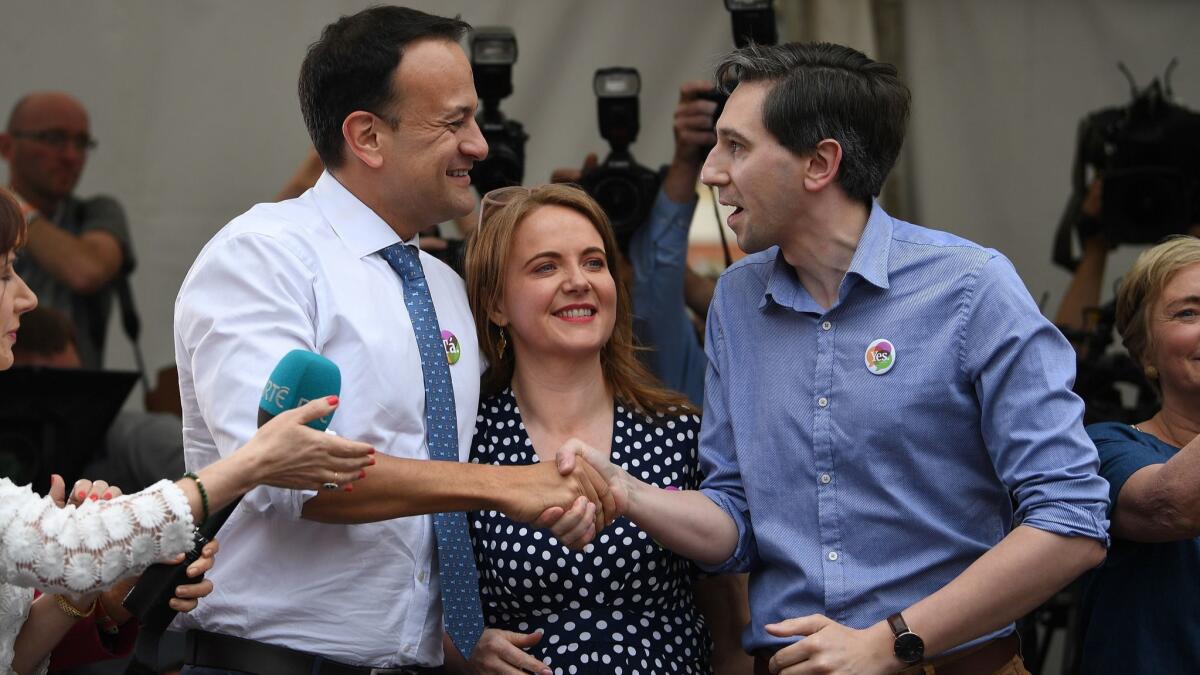Ireland’s overwhelming vote to repeal abortion restrictions is new evidence of a changed nation

- Share via
Reporting from Dublin — In a historic referendum closely watched around the world by activists on both sides of the abortion debate, Ireland overwhelmingly approved a referendum to end its constitutional ban on abortion, among the world’s most restrictive.
The vote was an undeniable confirmation of what has been true for some time: Modern Ireland bears scarce resemblance to the fervently religious and socially conservative society it was in 1983, when the amendment was inserted by almost the exact same margin by which it will be repealed after significant lobbying by Catholic groups.
Once an unspeakable taboo, the reality of abortion in Ireland has been brought into the open, spoken about with honesty and frankness on television, social media and in private conversations among families and friends.
Irish citizens living as far away as Japan and Brazil flew home to cast their votes, arriving by the thousands at airports across Ireland, determined not to miss a once-in-a-generation opportunity.
The mood was triumphant among “yes” campaigners and volunteers in Dublin’s main election center Saturday, where on the back wall hung a photo of Savita Halappanavar. Her death by infection in an Irish hospital in 2012, after she was denied an abortion she had sought for medical reasons, became a rallying cry for the country’s abortion rights movement. “We’ve got justice for Savita,” her father told the Guardian newspaper Saturday.
Since her death, increasing numbers of women and couples have publicly and privately shared their own stories of secret abortions and agonizing journeys abroad to terminate a child they had been told would not survive. “Yes” campaigners credit these testimonials for swaying some of Ireland’s most prominent politicians, including Prime Minister Leo Varadkar and Health Minister Simon Harris.
The vote had been expected to be close, but it proved anything but, as early results on Saturday confirmed Friday’s surprise exit polls. Those polls showed huge numbers in favor of repealing the ban and to introduce relaxed laws in line with other European countries.
Tears, songs and jubilation filled the courtyard of Dublin Castle as thousands gathered for the official announcement Saturday. The final result was 66.4% in favor of repealing the ban and 33.6% against, with 64.1% of eligible voters participating in the vote, the highest of any referendum in more than 25 years.
“This is Ireland’s second chance to treat women equally, to treat all with extra compassion and respect,” Varadkar said, after stating earlier it was the “culmination of a quiet revolution that has taken place in Ireland for the last 10 or 20 years.”
The “no” campaign conceded defeat around midday, when communications director John McGuirk acknowledged to state broadcaster RTE the country’s overwhelming decision to repeal the Irish Constitution’s 8th Amendment, which grants equal rights to the life of the mother and unborn.
According to the Irish government, at least nine women each day travel from Ireland to the United Kingdom to access legal abortion and three more take illegal abortion pills ordered online.

“Under the 8th Amendment women in crisis pregnancy have been told: Take the plane, take the boat. Today we tell them: Take our hand,” Harris said on Saturday in Dublin’s vote count center. “The people of Ireland have spoken very clearly today.”
Veteran activist and director of the official “yes” campaign Ailbhe Smyth arrived at the election center to rapturous cheers.
“We have actually rewritten history and we are creating an Ireland which ... values women, our bodies, choices, ourselves, our lives,” she said.
Others, of course, did not agree, and called into question the process.
“I don’t think it was a fair campaign. It was biased from the very beginning,” said Catherine Flynn, a volunteer for the “no” campaign, who pledged to continue to fight for her anti-abortion beliefs. “I’m here because of generations before me and I don’t want to kill generations to come.”
The decisive result, which will allow abortion up to 12 weeks after conception, gives the center-right minority government a clear mandate to enact additional proposed legislation that would extend the period for legal abortion in cases where the mother’s health is at risk or the fetus is diagnosed with a fatal condition. Harris, the health minister, said this could be passed as soon as autumn.
The referendum holds lessons for the global debate surrounding the dangers social media can pose to democracy.
“There were attempts to unduly influence the campaign through the likes of foreign ads from organizations based outside of Ireland, misinformation, but also the potential manipulation of voters from unregulated ads,” said Craig Dwyer of the Transparent Referendum Initiative, which tracked online advertising during the campaign. The independent monitor said Google and Facebook had failed in their attempts to safeguard their platforms.
The Irish vote may well have effects beyond its borders. Abortion activists from Argentina and Poland, which both tightly restrict terminations, were present in Dublin this week, keen to take inspiration for their own struggles.
“[The result] is historic .… Social movements around women’s rights in Poland will take some hope from it,” said Natalia Broniarczyk, of the Abortion Dream Team group from Poland’s capital, Warsaw.
Casey is a special correspondent.
UPDATES:
2:40 p.m.: This article was updated with staff reporting and additional details, including final voting results.
This article was originally published at 8:45 a.m.
More to Read
Sign up for Essential California
The most important California stories and recommendations in your inbox every morning.
You may occasionally receive promotional content from the Los Angeles Times.













